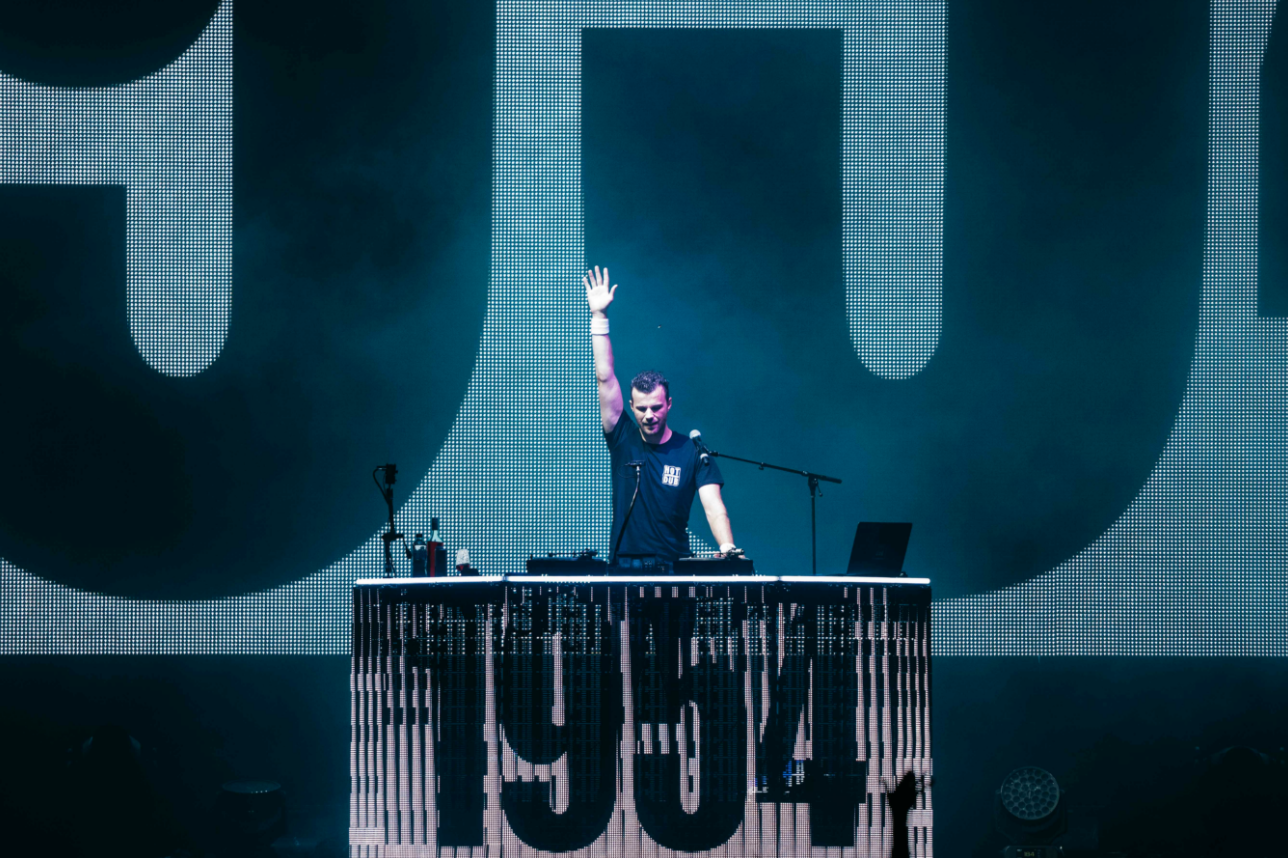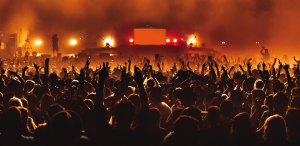
Hot Dub Time Machine on conquering musical snobbery and a party that money couldn’t curb
It’s to the credit of DJs, clubs and promoters the world over that club culture is as rich and diverse as it is today. It has come to be about much more than just music, and yet the music, regardless of its genre, remains its most integral ingredient, impelling each aesthetic, production and logistical decision that makes an event something to live long in the memory. Sydney’s Tom Loud, the sole creator and DJ behind Hot Dub Time Machine, is a man with his own distinct clubbing vision; one which centres around the unfeigned enjoyment of party music, played in chronological order, so as to take club-goers on a time travelling journey through popular music. It’s fun from the first to the last and has seen Hot Dub Time Machine gracing club and festival stages around the world.
Ahead of its first stop at Band on the Wall on 28th September, we spoke to Tom about his favourite DJs and their influence on his concept, his choice of gear and what a party without financial restriction might look like…
Hot Dub Time Machine is a fabulous concept; what planted the seed for the idea and are there DJs, past or present, who through their style, initially encouraged you to pursue the idea?
Absolutely. I love DJ’ing, I love watching great DJs and I love great parties. DJ Shadow is the biggest influence on everything I’ve ever done, but I particularly love his deeply layered, rehearsed, technical, pre-prepared DJ shows. Particularly ‘In Tune and On Time’ and his 45 sets with Cut Chemist. It shows there is a style of DJ’ing that can be more considered and planned than a normal DJ set, but that doesn’t diminish it, instead it makes it possible to deliver something really interesting that is a show, not just a set. And DJ Z-trip for doing the same thing but with rock music! I always liked this kind of DJ’ing, and was hanging around with a lot of comedians who were getting into Fringe Festivals and touring the world, and I thought I’d make a DJ show: something that happened outside of nightclubs, that had a beginning, middle and end, and stumbled into the time travel concept. That was in about July 2011, and the first Hot Dub was in September 2011.
Hot Dub Time Machine has graced the biggest festival stages, but presumably you tested the water in smaller club spaces when starting out? How would you describe your relationship with the more intimate club setting and does it alter the way you approach the show?
I certainly played hundreds of shows in small venues before I got to do massive festivals and it was fun… but to be honest I find performing very much a drug, where you need a bigger hit to get the same buzz. As the shows have been getting bigger, the buzz from playing smaller shows isn’t as intense and I always need to find a bigger crowd and a bigger experience!!! It’s just so fun to stand on stage playing music that you love in front of people who love it too. And the bigger the crowd, the bigger the sound as they lose their minds. However playing 40 minute festival sets does suck! A real Hot Dub set goes from 2.5-3 hours and is a complete musical adventure, with plenty of downs as well as ups. Whereas if I’ve only got a short time I just try to cram as much energy and awesomeness into it as I can and give everyone a really epic moment of adrenaline in their festival day.
Your sets take club-goers on a trip through time; if you could step back in time to witness one particular musical event, what would you go for?
I always say the ‘60s summer of love in San Francisco. What a time that must have been. Although I also would love to see Amy Winehouse sing live.
You’ve spoken before about how the project doesn’t take itself too seriously and puts pay to the idea of ‘guilty pleasures’. When you set the project in motion, did you feel club and DJ culture needed an injection of fun and do you feel there has been a culture-wide change since Hot Dub Time Machine began?
For sure. I feel like nightclubs and dance music can be really elitist and boring. I also find music snobbery really boring. And I used to be a massive music snob so I know what it’s like. I also find it weird that a lot of the music women like is dismissed as cheesy or not serious. F**k that. Great music is great music, and it’s fun to listen to great pop music in an epic nightclub or festival setting. I don’t play remixes or pre-made mashups, I play the actual song, in the best possible quality, and mix it with other actual songs on my turntables. And that is actually quite unique in the DJ world. I’m seeing a lot more retro nights, but I think that’s just a natural consequence of everyone getting old! I see plenty of imitators, particularly in the UK, but I have put 6 years of my life into this set and I feel like people can tell the difference. My core crowd remains actually really young and I think that is awesome.
You’re a Serato user and you’ve got serious DJ chops! What was it about timecode discs and vinyl emulation software that made sense for this project and had you tried alternatives prior to settling on this?
Great, a DJ nerd question! I seriously never get to answer these. I started using Serato because of the video functionality. That’s what first drew me in and remains the heart of my DJ’ing. Every song I play has to be cut to a video, and I manipulate and mix the videos along with the audio from the turntables. And Serato remains the best software to do that with. I’ve actually moved onto using a plugin called ‘Mix Emergency’ alongside Serato for the visuals as it’s better than Serato Video, but also made by another small, awesome New Zealand company. I think it’s now possible to do this with Pioneer but I have no interest in changing. I think Serato are a great company who look after their consumers and deserve the support. I never really learnt how to use CDJs, I went straight from vinyl to Serato and because I always did my own shows, I always brought my own gear. I sometimes have to use CDJs at afterparties and it’s never pretty. Even with Serato using vinyl is messy, organic and prone to constant technical problems. And that’s why I love it. Everything shouldn’t go too smoothly in a live show. If someone makes a mistake on stage it means they’re really working.
How do you typically listen to music, are you a streamer or more of a physical collector? Can you still listen purely for pleasure nowadays or have you always got one eye on the setlist and a songs potential for inclusion?
I listen to a lot of podcasts. Mostly comedy or obscure techno. I have my own podcast ‘Hot Dub Time Machine RADIO,’ that badly needs updating, but it’s been downloaded over 200,000 times! I think podcasts are a great way to enjoy music. And yeah, I like obscure techno because I can relax and bathe in music I know nothing about, I find it hard to switch off listening to anything else. I have a massive list in my phone of songs that could work in Hot Dub and I’m always listening for something new, or waiting for the perfect suggestion. Most of the best songs have come from awesome requests.
You’re constantly looking at ways to develop the show and enhance the experience for show-goers; if cash were no object, what would be the ultimate presentation of Hot Dub Time Machine and what might it incorporate?
I really love having guest musicians and performers. My ideal show would be started by Shirley Bassey doing the opening of ‘Get This Party Started,’ closed by Lorde doing ‘Green Light’ with John Farnham in the middle doing ‘You’re the Voice.’ And there would be SO much confetti, flames, fireworks and balloons! SO much!
Join the party and get your advance tickets for Hot Dub Time Machine here.







